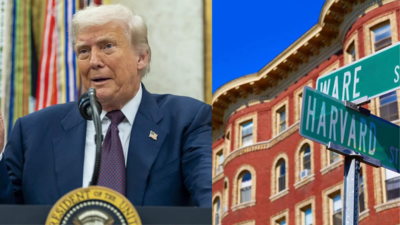ARTICLE AD BOX

For decades, Harvard University has symbolized the pinnacle of American higher education, attracting top students, faculty, and global attention. But over the past six months, the Ivy League powerhouse has found itself at the center of an unprecedented federal showdown.
President Donald Trump and his administration have repeatedly targeted Harvard, questioning its handling of antisemitism, challenging its governance, and threatening to cut billions in federal funding. The dispute has sparked a flurry of lawsuits, court rulings, and policy moves, leaving Harvard fighting not just for resources, but for its autonomy, its academic freedom, and the right to educate students from around the world.What follows is a detailed timeline of the Trump-Harvard battle: from the first warnings about federal compliance to the latest court decisions and what might come next.March 10, 2025 The U.S. Department of Education’s Office for Civil Rights warns 60 colleges, including Harvard University, that they could face enforcement actions if they do not protect Jewish students from harassment. All 60 institutions are under Title VI investigations.
Title VI of the Civil Rights Act prohibits discrimination based on race, color, and national origin at federally funded institutions. Harvard simultaneously announces a university wide hiring freeze for the spring semester, citing “substantial financial uncertainties” caused by the Trump administration’s rapid policy changes.
University officials stress the freeze is temporary.March 31, 2025 President Donald Trump’s federal Joint Task Force to Combat Anti-Semitism places $9 billion of Harvard’s federal funding — $8.7 billion in multi-year grant commitments and $255.6 million in contracts — under review, the largest sum targeted to date.April 3, 2025 The Trump administration sends Harvard officials a comprehensive list of demands tied to federal funding. The requirements include changes to academic programming, employee hiring practices, governance reforms, and the elimination of diversity, equity, and inclusion initiatives.April 11, 2025 A stricter set of demands is sent, threatening to pull Harvard’s federal funding if the university does not allow a third party to audit the viewpoints of students and employees.
The letter also calls for reducing the influence of certain faculty and administrators involved in activism.April 14, 2025 Harvard President Alan Garber publicly rebukes the administration’s ultimatums, saying the government overstepped its authority. Harvard’s legal counsel signals openness to dialogue but rejects demands “beyond the lawful authority of this or any administration.” Hours later, the administration freezes $2.2 billion in multi-year grants and $60 million in contracts.April 15-16, 2025 Trump threatens to revoke Harvard’s tax-exempt status and continues social media attacks, arguing the university should lose all access to federal funding and labeling Harvard a “joke” that “teaches hate and stupidity.” The Department of Homeland Security threatens to revoke Harvard’s authorization to enroll foreign students unless it provides “detailed records” of alleged illegal activities.April 18-29, 2025 Reports emerge that the April 11 letter was sent in error. The Education Department alleges incomplete foreign gift disclosures and issues an extensive records request. Harvard sues the Trump administration over funding freezes, arguing the government is attempting to control academic decision-making. Jewish Democratic senators criticize Trump for weaponizing antisemitism. Harvard releases reports on campus climate, finding that Jewish, Israeli, Zionist, Muslim, Arab, and Palestinian students felt uncomfortable or harassed during 2023-24.May 1-27, 2025 Harvard faculty pledge part of their salaries to support the university’s legal battles. Multiple federal agencies cut grants totaling hundreds of millions of dollars. The university dedicates $250 million of its own funds to sustain affected research. DHS revokes Harvard’s ability to enroll international students, prompting a lawsuit. U.S. District Judge Allison Burroughs issues temporary restraining orders, blocking enforcement.
The Trump administration threatens additional cuts and appeals court decisions. Harvard Kennedy School lays off employees due to funding cuts.June 4-25, 2025 Trump bars international students from entering the U.S. to study at Harvard for six months. Harvard amends lawsuits and obtains temporary restraining orders. Research colleges, alumni, and civil liberties organizations file amicus briefs supporting Harvard.
Harvard continues to plan for contingencies to allow international students to continue studies.July 9-23, 2025 Federal agencies allege Harvard violated Title IV and federal law, threatening accreditation and additional sanctions. Harvard discusses creating a center for conservative scholarship, with cost estimates between $500 million and $1 billion. Harvard estimates the combined impact of endowment tax increases and federal attacks could cost nearly $1 billion annually.August 1-26, 2025 Harvard alumni form Crimson Courage, urging the university to protect its community. Harvard refuses a $500 million settlement with the Trump administration. Analyses predict Harvard’s endowment could drop 40% by 2040 if attacks persist. The Department of Commerce reviews Harvard patents tied to federal grants, setting a potential precedent. Trump seeks $500 million from Harvard in a cabinet meeting, instructing McMahon not to negotiate.September 3, 2025 Judge Burroughs rules the Trump administration violated Harvard’s First Amendment rights by freezing $2.2 billion in federal funding in April and acted arbitrarily in halting funds. The administration immediately announces plans to appeal while indicating Harvard will remain “ineligible for grants in the future.”
What comes next
Federal judge, Burroughs, ruled that the Trump administration violated Harvard’s First Amendment rights when it froze $2.2 billion in federal funding, calling the government’s actions arbitrary and capricious. The ruling marks a significant victory for Harvard, but the administration has announced it will appeal, signaling that the legal and political battle is far from over. As both sides prepare for the next round, the outcome could reshape the future of federal oversight, academic freedom, and the very definition of what it means to be a top-tier American university.



.png)
.png)
.png)
















 2 days ago
4
2 days ago
4







 English (US) ·
English (US) ·